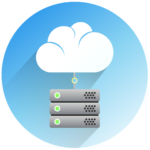Home / Handy Tips /

If you haven’t updated your businesses server in some time, chances are you are still using an on-site device. If you’re ready to upgrade, we highly recommend making the switch to a cloud server.
 The difference between in-house and cloud servers
The difference between in-house and cloud servers
Put simply, the ‘cloud’ refers to the internet. So, instead of existing as a physical object within your office space like an in-house or onsite server, a cloud server exists online. You may even be familiar with the idea through products like office 365 for business.
There are many reasons why we suggest opting for a cloud-based server. Let’s go through a few key benefits, so you can get a better idea of how a cloud server functions in small business environments.
5 benefits of cloud servers
1. Flexibility
Cloud servers are fully customisable, and incredibly flexible. You can pay as your business grows and evolves, and can choose and change the options and capacities that best suit your unique needs. You are not limited by physical storage, and are only required to pay for the space you actually need.
2. Lower cost
Most small businesses are working with a fairly strict budget, and little savings here and there can make a huge difference to your bottom line. Things like NAS storage may be great for offering a central space for your staff to access files at the office or remotely, however, you have to factor in the cost associated with on-site storage.
Cloud servers are a lower cost option than on-premise servers. Think about it this way: when you purchase a physical server, you are responsible for the entire setup. That includes installation, maintenance, expansion, and repair. What’s more, physical servers don’t last forever; most last for 3 or so years. At some point, you’ll have to pay for a brand-new server.
When using a cloud server, you are not responsible for the maintenance of any hardware. Instead, it’s up to your service provider to take care of. You pay a monthly fee, which stays the same every month. This makes budgeting that little bit easier.
3. Security
Cloud servers are renowned for their security – as long as you opt for a reputable service provider.
The best providers store their servers in a type of warehouse protected by maximum levels of security. Security guards, video surveillance, and even things like biometric security (finger print scans, etc.) are common.
In addition to that, server warehouses are protected against natural security threats, such as fire, flood, and electrical outages.
4. Accessibility
You must be connected to the internet to access files stored on a cloud server. That being said, you can be connected to the web from anywhere in the world, and still have fast and secure access to your business data. If you’d like help to ensure your wifi setup can handle the task, give us a call today.
You can connect to your cloud server through a smartphone, tablet, and any computer. So, if you or your staff work remotely, a cloud server is a must.
5. No downtime
Cloud servers are backed up in several geographically separate locations. This means if one server disconnects or loses power, you can still access your files. You can expect up to 99.99% uptime, meaning no lost files, no lost time, and most importantly, no lost business. Cloud servers are a great asset to your small business IT support range of options.
Get a cloud server for your business
If you would like to switch from an in-house server to a cloud server, get in contact. We can set you up with a cloud server solution that fulfils your businesses unique requirements. For all of your small business IT support needs, get in contact on 1300 553 166 or fill out the form on this page, and we’ll get back to you soon.








Leave A Comment